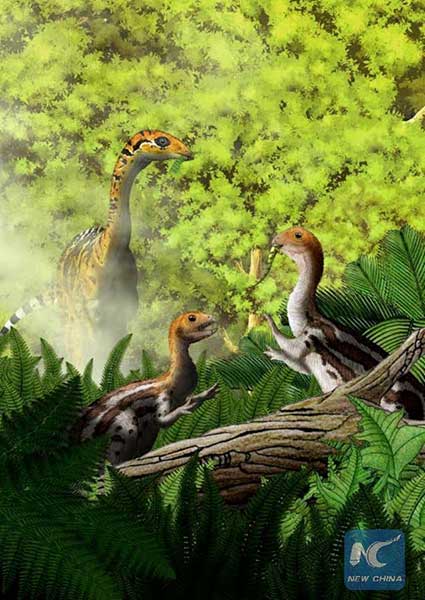Dinosaurs with teeth only as babies found in China
 |
|
This is an image of Limusaurus.[Photo/Xinhua] |
WASHINGTON -?An analysis of fossils of 19 ceratosaurian theropod dinosaurs known as Limusaurus inextricabilis in China showed these extinct animals had teeth as babies that were gradually lost as they grew up, making them the first known reptile with such characteristic, researchers said Thursday.
"We found a very rare, very interesting phenomenon in a ceratosaurian dinosaur whereby toothed jaws in juvenile individuals transition to a completely toothless beaked jaw in more mature individuals during development," said Shuo Wang of Capital Normal University in Beijing, China, whose study appeared in the U.S. journal Current Biology.
Together with other evidence, the findings led the researchers to conclude that the toothed juveniles were probably omnivorous meat-eaters but the beaked adults most likely transitioned to a plant-based diet.
Wang and colleagues first reported on Limusaurus in 2001, when they had just one fossilized juvenile, which was collected from the Upper Jurassic Shishugou Formation of northwestern China.
More specimens were found in the following years in the same area, but it wasn't clear that they all belonged to the same species.
"Initially, we believed that we found two different ceratosaurian dinosaurs from the Wucaiwan Area, one toothed and the other toothless, and we even started to describe them separately," Wang said.
As they started to code the dinosaurs' characteristics for phylogenetic analysis, they began to realize that they looked remarkably similar, except for the teeth.
Eventually, the researchers concluded that the specimens from 19 individuals, ranging in age from baby to adult, did represent the same dinosaur. It's just that those dinosaurs lost their teeth over time.
According to Wang, tooth loss isn't so unusual in animals alive today. For instance, there are fish and an amphibian that lose teeth as they grow. Platypuses lose their teeth too.
But this is the first time this characteristic has been recognized in a reptile, and the first time for any animal in the fossil record, he explained.
"This discovery is important for two reasons," said James Clark, a co-author on the paper and professor of biology at the George Washington University's Columbian College of Arts and Sciences.
"First, it's very rare to find a growth series from baby to adult dinosaurs. Second, this unusually dramatic change in anatomy suggests there was a big shift in Limusaurus' diet from adolescence to adulthood."
Chemical makeup in the fossils' bones supports the theory of a change in diet between babies and adults, said the study.
Limusaurus is part of the theropod group of dinosaurs, the evolutionary ancestors of birds, so the fossils also could help explain why birds have beaks, but no teeth, it added.






















